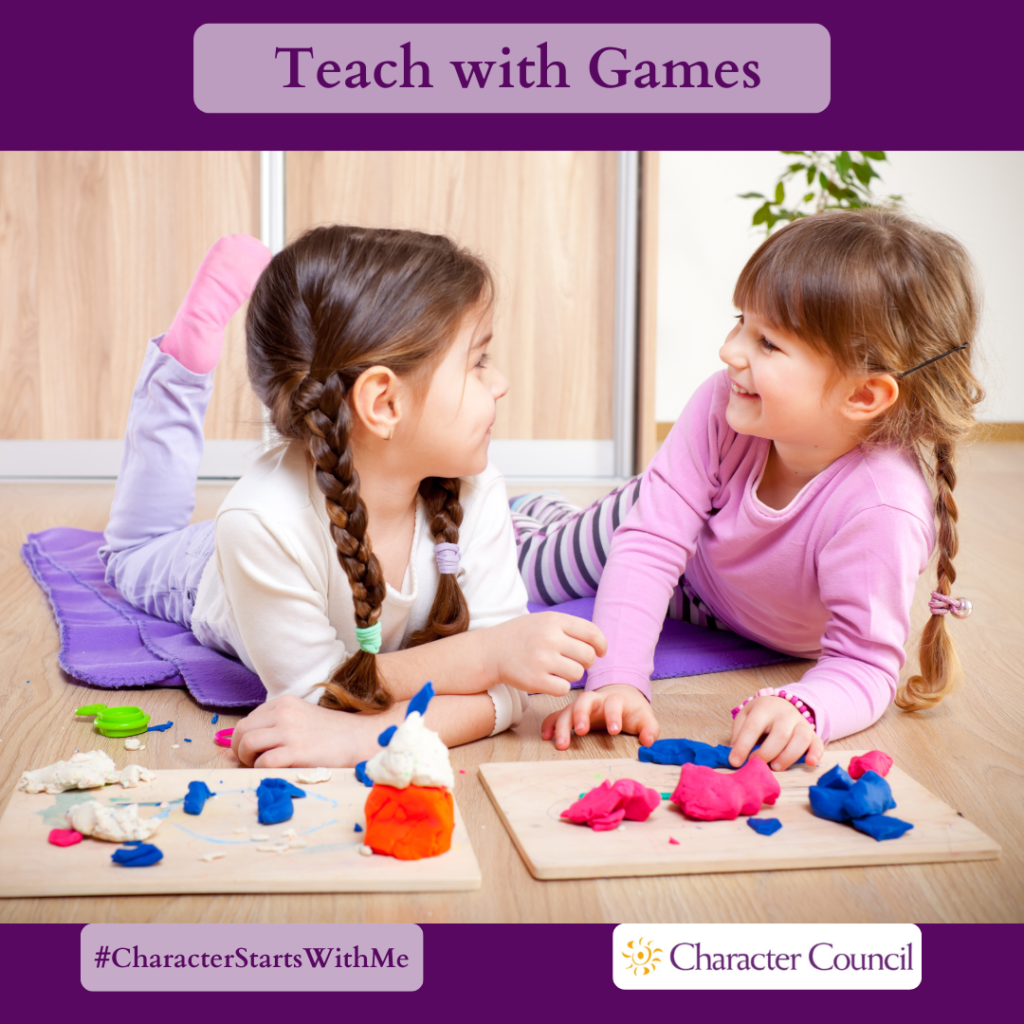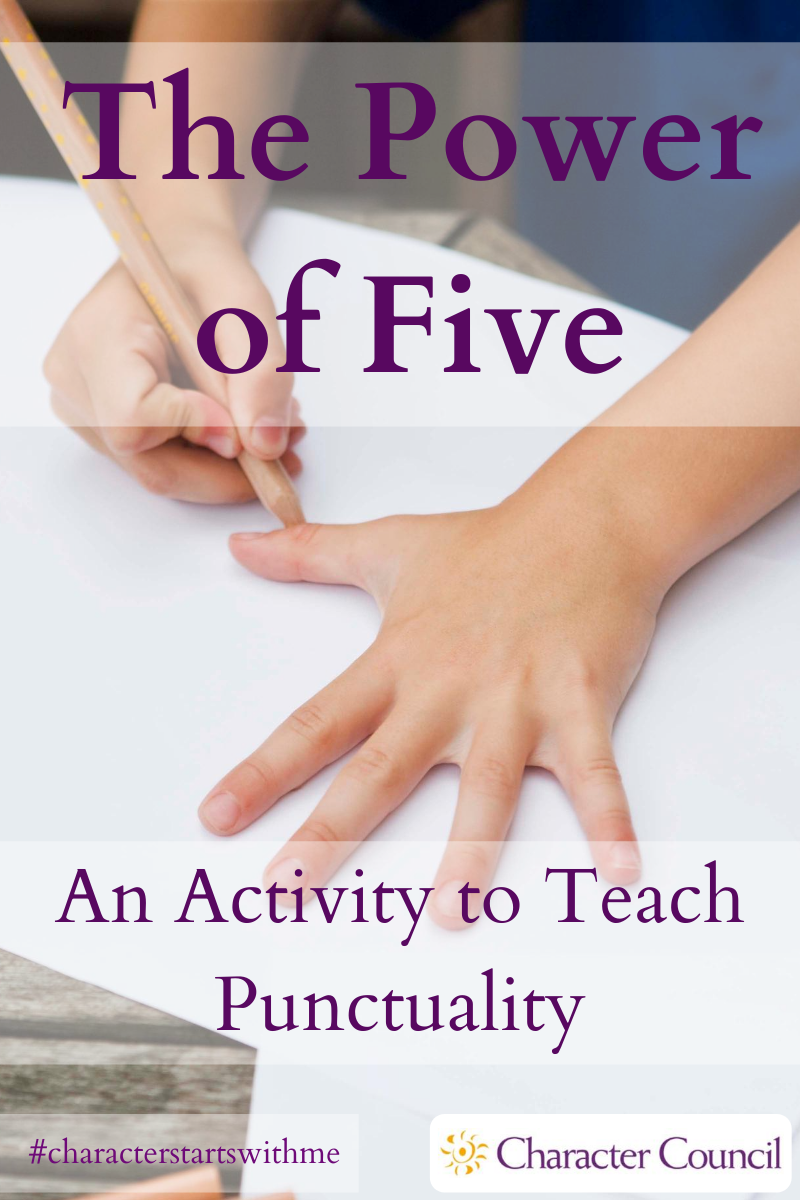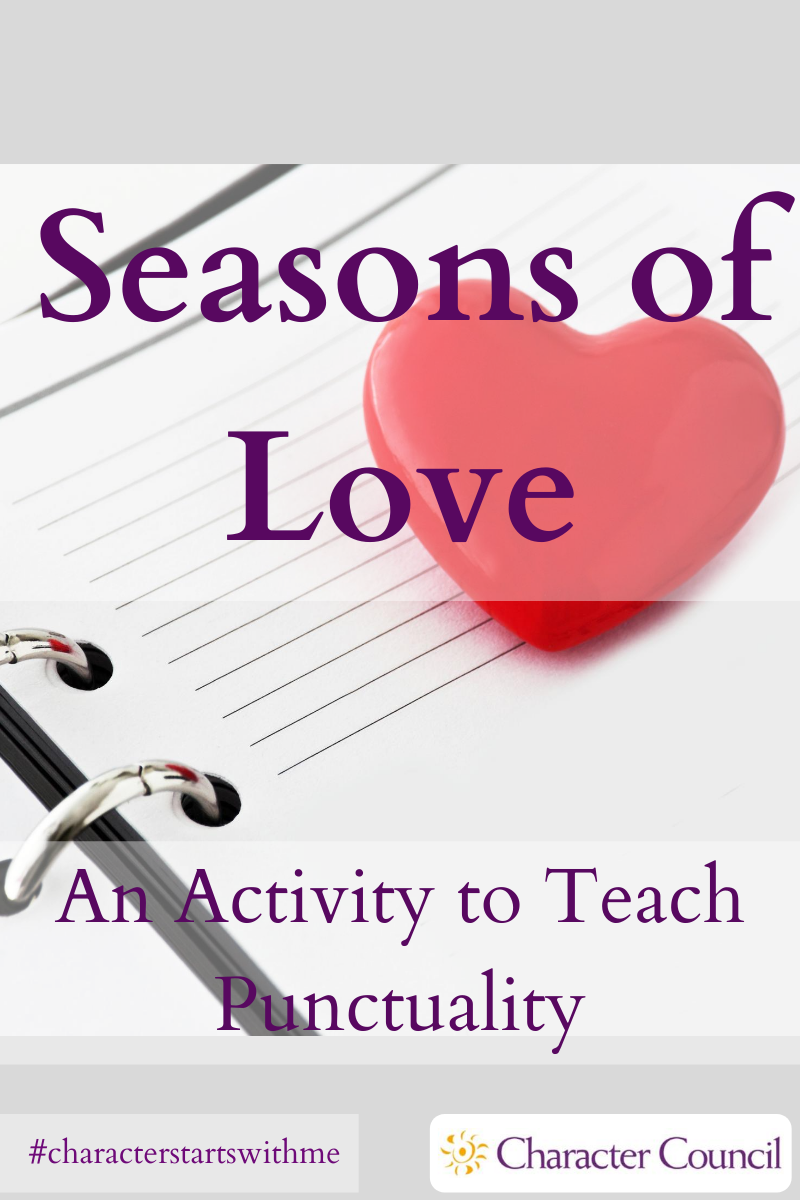
Punctuality Activities
The activities here are fun ways to teach character. The game aspect makes the lesson more memorable. Each activity has processing questions at the end. Without processing the activity, the exercise is just a game. To make it a stronger lesson when you process it, relate the character quality to a core value that your organization promotes.
Consider picking a student to run the activity. You will need to give them time ahead of the activity to prepare. Another option is to pick a few students to run the activity for a younger classroom after you have run it for your class. Encourage your students to repeat it in the home for younger siblings or even parents.


The Power of Five
It doesn’t have to be New Year’s to create resolutions. This exercise focuses on choices for organizing time and space to aid in punctuality. Each student will need three sheets of paper on which they will trace their hand. Inside the palm of the first hand, they should write Start, on the second hand, Stop, and on the third hand, Continue. On the hand labeled Start, they should write 1 thing on each finger and thumb of things they can start doing that will help them be more organized. On the hand labeled Stop, they should write 1 thing on each finger and thumb of things they can Stop doing that get in the way of being organized and punctual. On the hand labeled Continue, they should write 1 thing on each finger and thumb of things they can continue doing that will help them. You may want to review the 5 “I wills” of Punctuality to give them ideas. You may also list suggestions on the board for them to copy. You may also only require that they write a minimum of two things up to 5 in the interest of time. When they have finished, they should be put someplace that they can be revisited throughout the rest of the month/school year to serve as reminders of their resolutions. For non-writers, they can draw a picture on the palm of a handout of a hand large enough to draw in.
To process this activity, ask these or similar questions:
- Which was easiest to name, starts, stops or continues?
- Which was hardest to name?
- Which is going to be the easiest to do?
- What will you do to help you remember to start or stop something?
- Did listing the continues make you feel good?

The Punctionality Hunt
When you are on time, you are the one in charge of your schedule. When you are habitually late, it shows a distinct lack of control. In order to get more control or power look at the reasons for being late. Have the students identify the reasons people are late. Prepare a few ahead of time that are age-appropriate in case you need to get the discussion going. Ask them to think about being late for school, church, sporting events, practices, etc. Trace being late back to the beginning – not putting a book bag where it belongs the night before, not writing down assignments. Identify that being late doesn’t start the minute the clock ticks past a deadline. It starts when they fail to plan. Refer back to the definition of doing the right thing at the right time. It doesn’t say be on time. The character quality goes a little deeper and requires paying attention to what you should be doing. Tell the students they are Punctuality detectives and have them search for when the tardiness actually begins for each reason that they list on the board. Once the reasons are identified, have them come up with suggestions of what they can do to prevent that from happening again. Try to have them come up with more than one solution.
To process the activity, ask these or similar questions:
- Was it fun to be a detective?
- Did you learn anything about your habits that you can change to be more punctual?
- By associating all of the things leading up to being late, do you think you can pay more attention to doing the right thing at the right time?

Seasons of Love
Seasons of Love is a song from Rent that you may recognize based on the lyric “525,600 minutes”. For this exercise, divide the class into small groups and tell each group to pretend that they have $525,600.00 to spend however they want for the year. Let them know that they must spend it all – no saving! If they do not spend all of it, they will lose it. It isn’t important that they know the actual prices of things. They can just budget so much of the money to purchase a group of items. For example, they may budget $2000 on pizza, $5000 on CDs, $8000 on new shoes for the group. Ask each group if they would be able to buy all of the items in a single year. If you have younger students, then do this as a class exercise where you record the purchases on the board and keep a tally of what is left to spend. When you are finished, then tell them that there are 525,600 minutes in a year. Just as we planned on what we would spend money, we should also plan on what we should spend time.
When the exercise is over, play the song. This YouTube version has the lyrics so you have a visual of the number but there are many from which to choose.
To process this activity, ask these or similar questions:
- Was it easy to spend all that money? Did it seem like a lot?
- What do you think it means to measure a year in love?
- How do you measure a year? After this exercise, will you think about that differently?